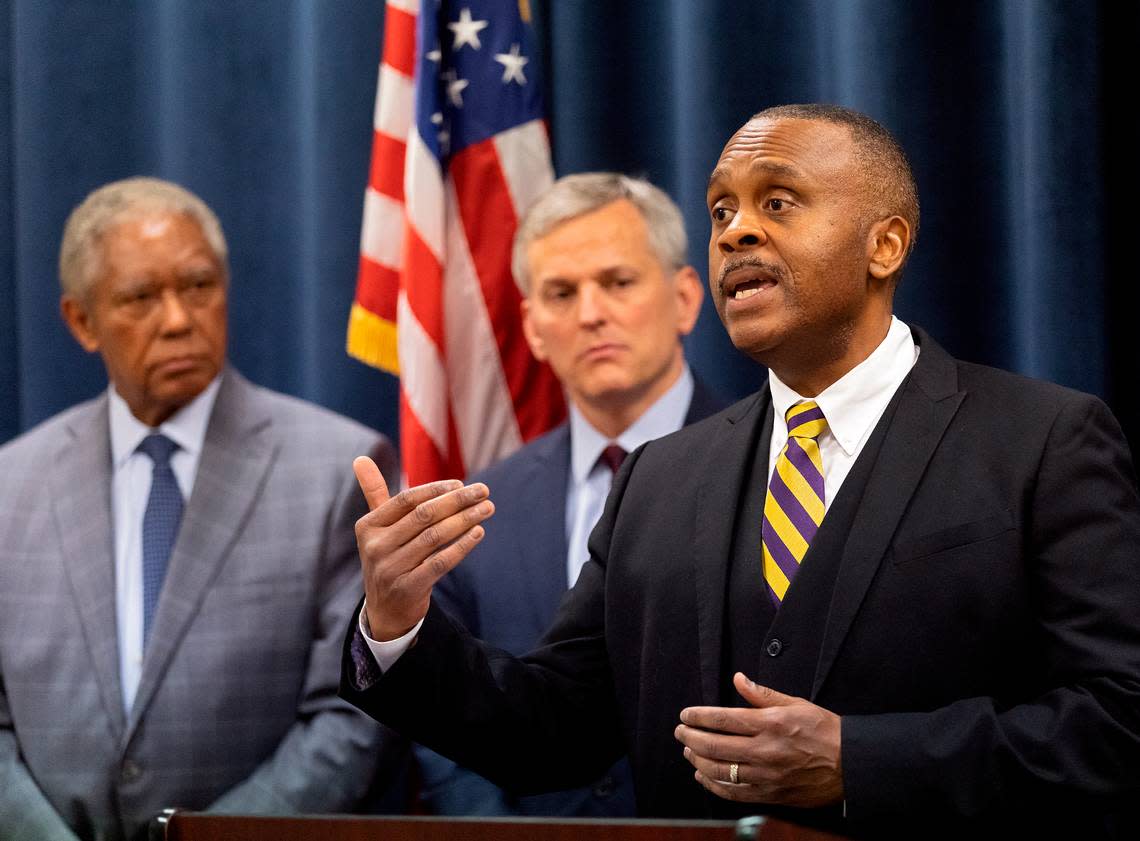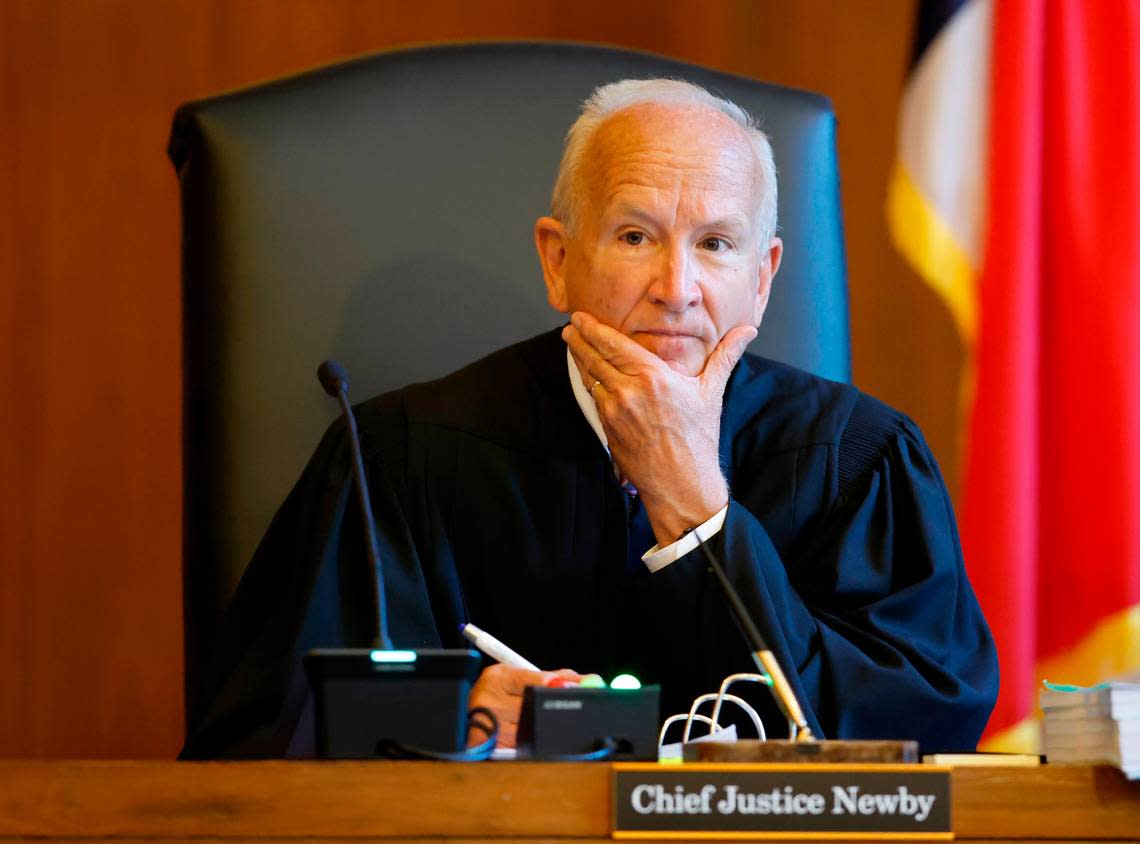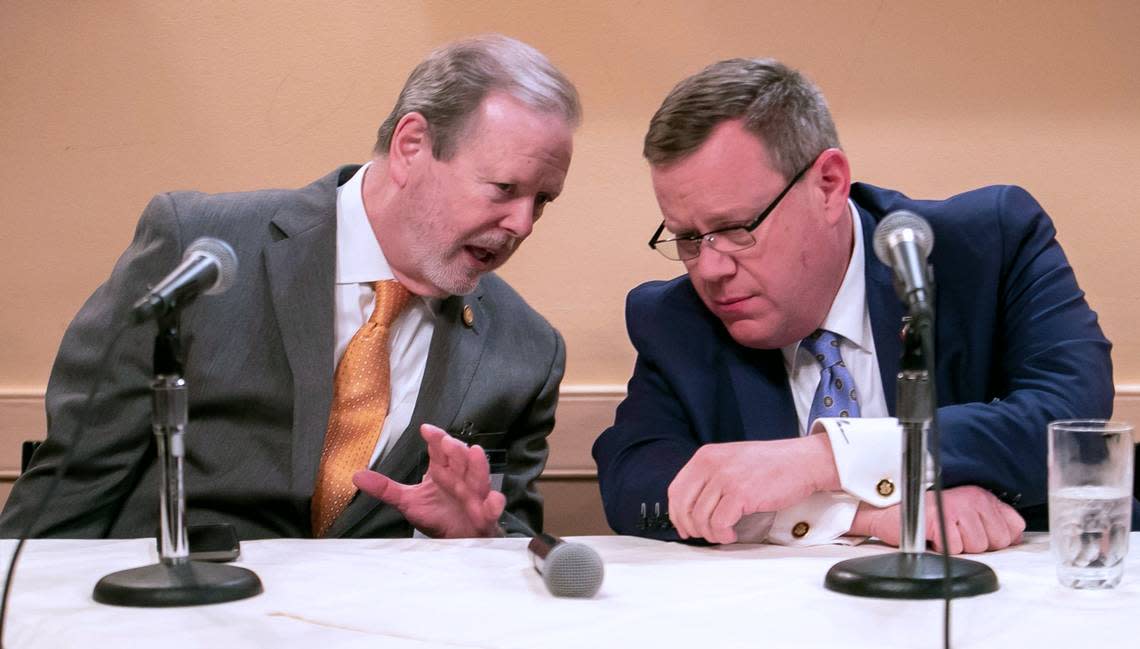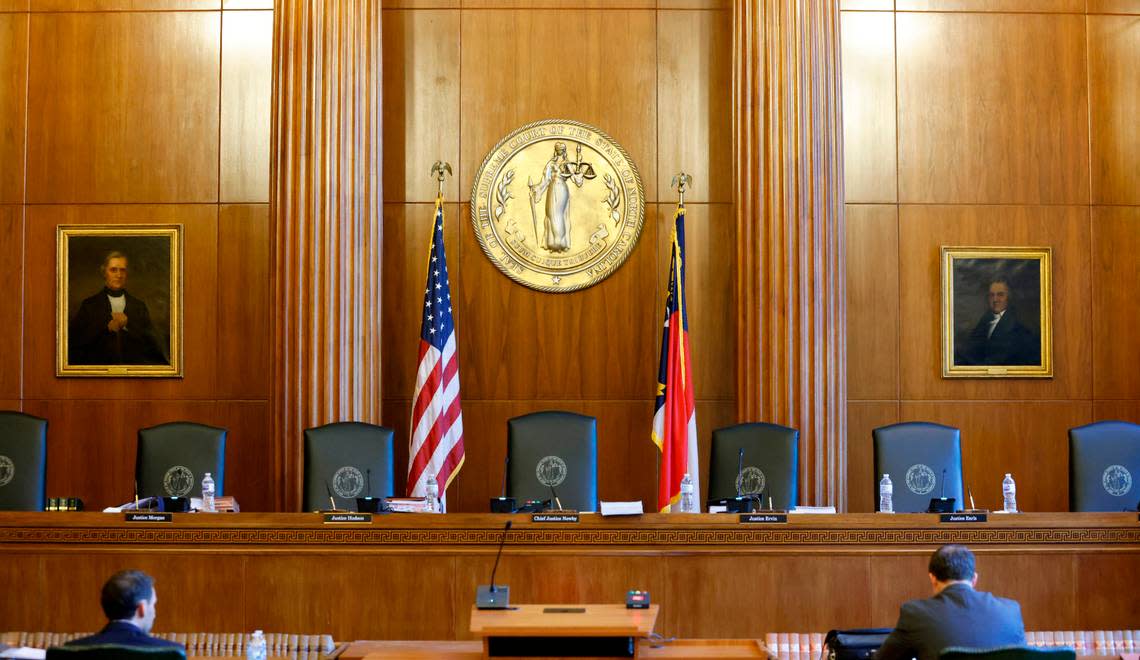Why the latest NC GOP attempt to shift power is likely to end up in court
North Carolina’s separation of powers — and the state’s balance of power — is again at play with pending legislation that would take more control away from the governor.
Gov. Roy Cooper is a Democrat, but he’s in the last year and a half of his second term, so whatever bill becomes law is more likely to directly impact the next governor than Cooper. Whether that’s another Democrat, or a Republican, they would take office with a few less appointments to make.
Rep. Robert Reives, a Chatham County Democrat and the House minority leader, told fellow lawmakers that North Carolina could end up with “a legislature that can pretty much do whatever it wants, unchecked, any time, any way.”
Senate leader Phil Berger told reporters on Thursday that another move related to boards was coming soon.
“I don’t want to tell you too much. I think you might see movement next week on the Board of Elections,” Berger said.
Because Republicans have a supermajority in both the House and Senate, they have the votes to override a veto and make a bill become law without Democratic support.
Senate Bill 512 is on that track. It could be a test for the N.C. Supreme Court, which swung to a Republican majority in the 2022 elections. Republican House Speaker Tim Moore has already said he expects litigation if it passes.
The central question at the heart of the debate is whether or not it is constitutional to shift power away from the governor.
“As it stands,” Sen. Warren Daniel, a Burke County Republican, said in a recent hearing, “these boards are largely comprised of members that are handpicked gubernatorial appointees, or individuals who serve in the governor’s administration. This doesn’t bode well for diversity of thought or representation.”

The constitutionality debate
Some of the General Assembly’s members are also lawyers. Here’s how one conversation between two lawmaker-lawyers played out when the bill was in a committee:
Rep. Vernetta Alston, a Durham Democrat, noted that the courts already require the governor to have a majority of appointments on certain boards, while the bill would give some power to other members of the Council of State, who like the governor are part of the executive branch.
“As I read it, the courts and our constitution require that this authority be housed specifically with the governor, not necessarily the larger executive branch,” Alston said.
Alston and other Democratic lawmakers questioned whether the bill would violate a January 2016 ruling by the state Supreme Court, in the case McCrory v. Berger. That’s the ruling that says the governor should appoint a majority of certain boards, depending on their function.
Daniel defended the bill he sponsored, saying Republicans “believe that the executive branch still has a majority on these boards and commissions that satisfies the conditions of McCrory v. Berger, or the factual circumstances are indistinguishable or have not yet been considered.”
Then-Justice Paul Newby wrote the dissent for part of the ruling, and is now chief justice on the Republican-majority court.

Expect court challenges over boards bill
In the same committee hearing, Rep. Pricey Harrison, a Guilford County Democrat, said she sees the bill from a perspective “as a taxpayer who has funded a lot of this litigation where we have enacted unconstitutional bills, and it just seems very frustrating that we’re getting ready to pass another unconstitutional bill.”
Similarly, Cooper said the General Assembly shouldn’t pass laws with the expectation of litigation.
“These boards that we’re talking about are really important in helping a governor administer the law, and it’s the reason the court has held that the governor should continue to have a majority of the appointments to those boards. I believe that the legislation is unconstitutional,” Cooper told reporters at an unrelated event.
“I heard the speaker say the other day that he anticipates litigation. You shouldn’t pass laws that you know are unconstitutional and that you’re going to anticipate litigation,” Cooper said.
Asked to respond to Cooper calling the bill “unconstitutional,” Berger disagreed and mentioned the courts.
“We disagree with him as to whether or not it’s constitutional. And we’ll see what the courts say if he decides to sue,” Berger said.

Changing balance of power
Republicans passed a series of laws as soon as Cooper won election in 2016, and before he took office, which curtailed his power over appointments. Some were struck down in court, including a push for appointment changes and partisan balance on elections boards that are now controlled by the governor’s party. Others were upheld.
Then, after Cooper’s COVID-19 restrictions, the legislature passed a law that limits the governor’s powers during emergencies.
House Speaker Tim Moore told The N&O early in the session that Republicans were still interested in balance-of-power issues.
Republicans have been “frustrated with what we thought were some very bad decisions from prior courts when it came to balance of power in North Carolina,” he told reporters after a recent House session. “Our state was founded with a notion that the legislative branch would be the branch with the most authority because — remember the whole thing of the royal governors and all that stuff?”
The first North Carolina Constitution in 1776 gave the governor very little power, with just a one-year term. A later one gave the governor a four-year term.
The way the House speaker sees it, “it was clearly contemplated and spelled out in the constitution that the legislative branch was to have the most authority because it’s the closest to the people. I mean, we only what, in the 1990s, even gave the governor a veto. Which, by the way I’d like to roll that back if we could, but that’s not going to happen,” Moore said.
Gerry Cohen, who spent nearly 40 years as a legislative staffer including as general counsel, said this is all part of a cycle.
“We’ve cycled through changes in this for 40 years or so. In the early ‘80s, we used to have situations where the speaker and (Senate president) pro tem would directly make appointments,” Cohen told The N&O in an interview this week. That changed after a state Supreme Court ruling in 1982, he said, and since then the state has cycled through who gets to make appointments to various boards, whether it be the entire legislature or the governor.
“I think this bill is sort of a pushback in the other direction,” said Cohen, who’s now a member of the Wake County Board of Elections and teaches at Duke University.

‘Seeing what they can get away with’
Kym Meyer, senior attorney for the Southern Environmental Law Center, which has argued in support of Cooper’s challenges to separation of powers issues, said the bill is about “seeing what they can get away with.”
The changes would affect appointments on a variety of boards and commissions, reducing more than 20 of the governor’s appointments.
“This bill is just a grab bag of different legal arguments,” she told The N&O, saying it’s a “whole new level of audacity.”
Meyer said she is completely shocked by the bill.
“What matters here the most is the legislature drafting and passing legislation they know is unconstitutional, more than the substance of the law itself. It’s marching around and saying we don’t care,” she said.
“Where do you stop with that?”
Meyer said with Republicans having control of the Supreme Court as well as the General Assembly, it’s about “using the Supreme Court to change the law.”
What’s next for the bill
The House made some changes to the bill different than what the Senate wants, including increasing the number of members on the UNC Board of Governors, so once they get those “ironed out,” Berger said Tuesday, he wants to bring it back for a vote as soon as possible.
The House and Senate members who will negotiate the final bill were appointed Wednesday. In the Senate, they are Berger, Daniel and powerful Senate Rules Chair Bill Rabon. In the House, they are Moore and Rep. Destin Hall, the House Rules chair.
